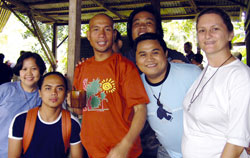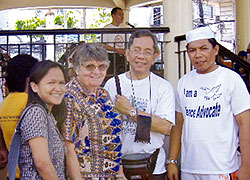The city of golden friendship
Muslims and Christians in Cagayan de Oro, Philippines, are working together in their commitment to seek peace
By Sr. Christine Gebel, O.L.M.
January/February 2007
Return to Table of Contents
Print Article
The City of Golden Friendship, Cagayan de Oro, is located on the island of Mindanao in the Southern Philippines. For some people, Mindanao brings to mind images of fighting between Muslims and Christians, and the leftist New People's Army's war against the government. This is true, but Mindanao is a big island and Cagayan de Oro is a peaceful place.

Participants, including Our Lady's Missionary Sr. Christine Gebel (far right) at the Ranao Muslim-Christian Movement for Dialogue and Peace meeting held in Balo-i, Lanao del Sur, Philippines, May 2006.
Or is it? If peace is simply the absence of war, yes, Cagayan de Oro is at peace. However, if peace means that a community is working together for the good of all, living in harmony and being open and sensitive to others, we are not truly at peace here.
Ironically, it is the parts of Mindanao that have the cruelest history of violence and strife that are now working the hardest for peace. Since we do not have open fighting here in Cagayan de Oro, it is difficult to arouse interest in Muslim-Christian dialogue for peace.
Thus, we are a small, yet dedicated group of Muslims and Christians linked up with the Silsilah Dialogue Movement which is based in Zamboanga City (on the other side of the island). We also network with the Ranao Muslim-Christian Movement for Dialogue and Peace which is based in Marawi City (a little over two hours away by public transport).
Together with the Ranao group, we recently participated in a five day interfaith peace workshop entitled, "Together Building Just Peace". Held in our own City of Golden Friendship, the workshop was sponsored by the Young Ambassadors for Peace of the Uniting International Mission of the Uniting Church in Australia (formed in 1977 as a union of the Congregational, Methodist and Presbyterian traditions).
Our Lady's Missionary Sr. Mary Gauthier and I brought the Scarboro Missions Golden Rule poster with us to the workshop hoping to find a way to share it with other participants. As always happens, people were very interested in the poster and many asked for a copy. Due to Scarboro's generosity, we had copies available to strategically distribute – one to the facilitator of the workshop to take back to Australia, and others to universities and places of worship. We also encouraged people to look up the Scarboro website.
At one point during the workshop, I looked around the room and saw that we were Muslims, Christians and Tribal people, men and women, young and not so young, coming from cities and small villages from four different provinces of Mindanao.

Members of a local dialogue group, and organizers of the walk, participate in a Walk for Peace, L-R: Ellen Red, Our Lady's Missionary Sr. Mary Gauthier, Msgr. Rey Monsanto (Vicar General of the Archdiocese of Cagayan de Oro), and Mohamad Gondarangin (President of a local mosque). Cagayan de Oro, Philippines.
And then I remembered the story of one of my roommates, a Muslim woman. Her father was shot dead by a soldier, a Christian, for no apparent reason when she was in grade five. She said that she did not harbour hatred against Christians because she always associated the soldiers involved with her father's death more with the Marcos dictatorship and martial law rather than with their Christian religion.
Then, there's the story of my "buddy" (during the workshop, we used a buddy system to keep track of each other). My buddy was a young Christian man whose father is with the Armed Forces of the Philippines. This young man's father has been in hospital suffering from Post Traumatic Stress Syndrome for the past two years after fighting in numerous battles against the Moro Islamic Liberation Front. He wonders if his father will ever fully recover.
If these two victims of violence can commit themselves to peacemaking, how can I not? If these two people can even work together for peace, there is hope for all of us.
And truly, one of the first steps we can take is to recognize and honour the unity we share in the Golden Rule.
Christine Gebel is a member of Our Lady's Missionaries and has been working in the Philippines for the last 15 years. Her ministry includes Muslim-Christian dialogue, work with Amnesty International and involvement in Basic Christian Communities. Christine has helped to organize literacy centres for children who do not attend school.
Interfaith lessons I have learned
Columban missionary Fr. James Fleming shares the learnings he has acquired in his more than 20 years of interfaith work, primarily in Muslim-Christian dialogue:
- Relate to others as equal partners in the search for truth.
- Recognize that listening as well as speaking is necessary for a genuine conversation. Remember the words of St. Francis of Assisi: "Preach the Gospel always, and when necessary use words."
- Treasure the sense of wonder that comes with encountering the new, the unusual and the surprising.
- Be hungry for knowledge about the other person's culture and religion. Learn to understand what others actually believe and value. And allow them to express their beliefs and values in their own terms.
- Be honest in sharing your beliefs and do not try to water them down to accommodate. Other people see through this and lose respect for you.
- Do not misrepresent or disparage other peoples' beliefs and practices.
- Be aware of your own need for ongoing conversion to your professed beliefs. Remember, it is not our job to convert others to our beliefs, but to be faithful to our own.
- Respond to others as a gift, not as a threat.
- Be sensitive to vulnerable people and do not try to exploit them.
- Remember that it's our differences that can make a difference, so rejoice in the richness of our diversities.
Return to Table of Contents
Print Article